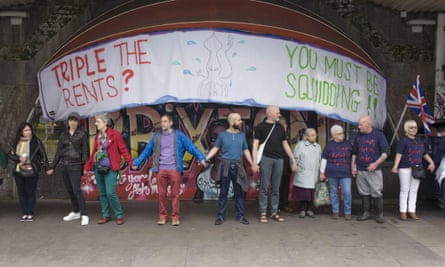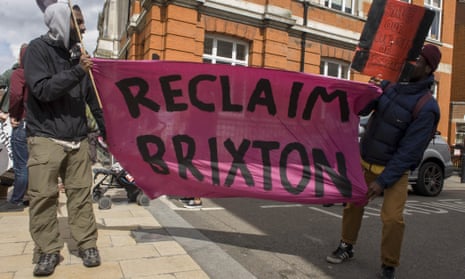Brixton’s roads were blocked for most of Saturday as crowds rallied outside the Black Cultural Archives and protest marches against gentrification halted traffic as they circled the high street and market.
Protesters vented frustration at a lack of affordable homes, closures of long-established local businesses, alleged police racism and a perceived influx of wealthier residents with no connection to the area’s history.
But tensions rose as the evening wore on. Police blocked a junction in front of the police station after clashing with protesters outside a payday loan shop. Hundreds of protesters dancing in the street outside Lambeth town hall were forced back by lines of officers after they blocked traffic.
Activists had earlier tried to occupy the town hall as well as the police station, where CS spray was used to repel “a small group of protesters”; and a loose standoff had blocked the high street when dozens of police rushed to defend Foxtons after its window was smashed.
The afternoon began with a crowd of several thousand gathered on Windrush Square under the banner of a “gathering to reclaim Brixton”. The rally became a focal point for protest marches of differing sizes and routes which snaked through the area. Banners proclaimed “black communities matter” and “respect existence or expect resistance”.
Brixton is a historic cultural hub for African-Caribbeans and other minority groups, but rising rents, redeveloped shopping areas and an influx of wealthier residents have led to a sense that the old community is being forced out.
Tej Adeleye, 25, a commercial writer from north London, said: “As someone who was born in London, Brixton represents a long lineage of black struggle. I’m not saying any place should stay the same but there’s something really disturbing about the pace of change. I don’t want to see Brixton become like another Shoreditch that’s got no personality.”
Chardine Taylor-Stone, 29, was one of a group of women who helped organise the gathering. She said: “The aim really is to highlight the issue and bring people together who are really angry about the situation. Just putting an event on and seeing so many people coming really shows that people are scared and frustrated.
“It’s also people showing love to Brixton as well. It’s a culturally important area not just for London but for the black community in particular. It’s almost like, if they can take Brixton, they can take anywhere.”
Direct action targeted the recently redeveloped Brixton Village shopping area, which has become symbolic of the changes to the district. Activists from the London Black Revolutionaries group led a march through its narrow warren of restaurants and cafes, halting for poetry performances proclaiming “remembering our roots is liberation” and “black communities matter”.
The action was meant as a “remembrance” of Brixton’s black history said Black Revs activist, Hani Hill, 23, said: “We marched through Brixton Village to remember what it used to be like a couple of decades ago when it was a very ghettoised community.”
Hill said poor people could no longer afford to buy a coffee or breakfast in the complex, which was once an extension to Brixton market. “We’re trying to fight that gentrification and protect residents and small businesses from developers.”
A woman sitting at a table outside Coffee Federation as the demonstration came past said she was “100% with them”. She hesitated when it was pointed out that cafe was a target of the protest, but said: “I understand, but what can you do? This is a nice place to meet your friends. You have got to connect the two things together.”
Many people who came for the gathering merely spent a languid day in the sun on Windrush Square, where performances, speeches and food stalls contributed to a carnival-like atmosphere. Trade unionists mingled with rastafarians and youths with senior citizens as barbecue smoke and reggae music filled the air.
“It’s what I would expect in Brixton,” said Cyndy Anafoe, 41, another of the women who helped organise the gathering. “This is the poster child of multiculturalism. We are rich in diversity. Everyone is represented here and that’s what we wanted.”
Taylor-Stone said she hoped the event would inspire others to organise. “What we would like to happen is that people will go home to their local area, set up a little campaign group and start the conversation, start pressuring councillors. This is a kind of a look-at-us moment and it’s up to the people that come here to do something in their community.”

Jamal Ramsey, 17, from Dulwich, said he had come to support the community. “Brixton is becoming very commercialised, gentrified. It’s losing it’s diversity and its cultural side,” he said. His friend Nathan Rogers, 18, added: “Businesses which have been here for decades are being moved out. People are being displaced by having to move out because of rising rents.”
Brixton has a history of violent protest and organisers were keen to stress that Saturday’s events should remain peaceful, but emotions ran high. A witness said a single person carried out the attack on the Foxtons office. Another bypasser, Olivia Stewart, said she was mortified by the attack. “I can categorically say it was no one from our peaceful protest,” she said.
Anger grew later outside a payday loans shop on the junction opposite Brixton’s police station. Police clashed with protesters who surrounded the shop, trying to confiscate banners and donning helmets and armoured gloves when cans and a bottle were thrown. Protesters fell back to avoid being surrounded by dozens more police arriving to block the junction.
But it was the outbreaks of rain rather than violence that brought demonstrations to an end.
Confrontations were perhaps inevitable given the anger felt by some. A 21-year-old activist with the Black Revs, a student who preferred not to give his name, said: “People say we’ve been here for the hard times, the tough times, we’ve struggled to be here and a few people of a higher social class, people of privilege, are coming here and they are shitting on them.”
Despite the tensions, the mood at the demonstration was mainly upbeat and hopeful. Speaking specifically about the group’s earlier direct action, but in a comment that summed up the day, Joshua Viraswami, another Black Revs activist, said: “It was a beautiful act of remembrance and resistance showing that the struggle against social and ethnic cleansing is unstoppable.”

Comments (…)
Sign in or create your Guardian account to join the discussion